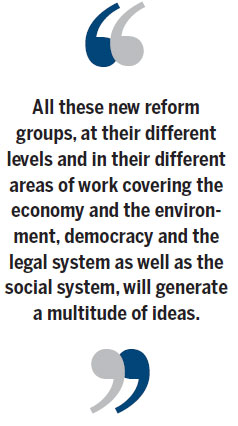Keeping the momentum going
Updated: 2014-10-24 07:28
By Giles Chance(China Daily Europe)
|
|||||||||||


For the rule of law to prevail, a strong leader who imposes his will is needed
The Third Plenum of the 18th Chinese Communist Party Congress, held in Beijing last November, sent a signal that China was going to change directions. A vision of reform was set before the Chinese people that covered all aspects of Chinese life: the economy, the role of the Party and the government, the armed forces, and Chinese culture and society. Along with the vision came a to-do list, consisting of more than 300 items, with reform of state-owned enterprises and the rule of law at the top. Both at home and abroad, the plenum was greeted enthusiastically but cautiously. The list of items to be reformed seemed very long, while the changes required seemed unimaginably large. Most people felt that the sense of inertia in Chinese bureaucracy, which had always shown itself as a powerful force for the status quo, would prove to be too powerful for such big changes.
But in November 2013, most commentators had not fully comprehended the determination with which the government would approach its task. The depth and fierceness of the Chinese government's anti-corruption drive has surprised most people. At the time of the third plenum, former Chongqing Party secretary Bo Xilai's fate was already sealed, but the conviction and sentencing on corruption charges of the former minister of railways and the deputy head of the Central Military Commission has shown how high Wang Qishan, the Standing Committee member in charge of Party discipline, will strike. The strong move against official corruption has supported the government's efforts to dispel complacency and instill a mood of change at central and local levels of official bureaucracy. The establishment of the Deepen Reform Leadership Small Group campaign headed by President Xi Jinping has demonstrated his personal involvement in the process and the emergence of the Deepen Reform Leadership Small Groups campaign at central, provincial and even county levels throughout China shows how effectively Xi has mobilized the resources of the Party and the government to bring new dynamism and to penetrate China's bureaucracy.
Powerful central government agencies, who would normally be able to resist attempts at change, like the National Development and Reform Commission and the State-owned Assets Supervision and Administration Commission, have been seriously weakened by the anti-corruption drive. Other central and provincial level government bodies, seeing what is happening to powerful organizations that threaten the president's reform efforts, have been falling over themselves to comply with the government's demand to come up with solid reform proposals.
All these new reform groups, at their different levels and in their different areas of work covering the economy and the environment, democracy and the legal system as well as the social system, will generate a multitude of ideas. But many of these proposals will be no more than officials' attempts to show compliance with the new policy direction. Weeding out these weak efforts, and focusing instead on the practical and useful suggestions addressing the core issues will be essential.
Take for example the much-discussed reform of the state-owned sector, via the injection of private enterprise into state-owned enterprises. Since the policy was announced, large SOEs like Sinochem and CITIC have announced financial restructuring that introduces private capital. But because real control, after-restructuring, stays with the relevant ministry in Beijing, these are no more than deal-making between the public and private sectors. More significant is the proposal of Huang Qifan, the mayor of Chongqing, approved by the local agency of the State-owned Assets Supervision and Administration Commission, that includes listing all the assets and liabilities of SOEs on the stock market, and turning the government's role into a strategic, market-oriented investor, much as Temasek did in Singapore.

One important focus for the fourth plenum just held has been to show that it is real reform the government is interested in, not mere showcasing that does no more than strengthen the positions of certain officials.
The reform effort has been criticized for depending too much on Xi's own political capital.
But real change in China has often had to come from outside, because the system, over the thousands of years it has been in place, has developed huge inertia and resistance to change. The biggest shock to China's economy since the reform period started in 1980 came from an event external to China: The entry to the World Trade Organization in 2001. This placed China within the global rule-based trading system. It reassured many foreign companies and encouraged them to invest in and buy from China. The result was China's export boom, the building-up of China's foreign exchange reserves and massive increases in Chinese productivity and employment. Yet, if the bureaucrats had been allowed to have their way it would not have happened, because entering the WTO damaged many special economic interests within China.
Today no one can deny that China is faced with a host of difficult problems, from the environment to productivity growth, to its place in the world. It needs to address these problems by changing. Only by developing a strong momentum can change be brought to China. Xi's approach is necessary because of the system's natural resistance to change, and admirable because it addresses the key issues.
The challenge for the fourth plenum is not just how to create an effective government that operates along reformed lines, but how to raise the function of law so that Chinese society and the economy is ruled not by the personal whim of powerful officials, but by law that comes from the people through their appointed representatives. This means that government officials must operate within the law. The courts judge on the law and the government executes the law and operates within it.
For the rule of law to come out on top in China, without some kind of violent struggle beforehand, requires a strong leader who is able to impose his will to promote a system that, paradoxically, will set a limit to the power of government officials.
The author is a visiting professor at Guanghua School of Management, Peking University. The views do not necessarily reflect those of China Daily.
(China Daily European Weekly 10/24/2014 page10)
Today's Top News
Highlights of Shenzhen Int’l Photography Week
Palace Museum needs to design landmark souvenirs
In Guangdong, 42 hours of fear
Ambassador urges young people to build up ties
Capital outflow fears unfounded
New proposals for care of the elderly
European Council appoints new commission team
Financing of projects focal point for APEC
Hot Topics
Lunar probe , China growth forecasts, Emission rules get tougher, China seen through 'colored lens', International board,
Editor's Picks

|

|

|

|

|

|





